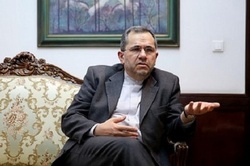 With the US building up its military presence in the Persian Gulf, Iran's ambassador to the UN says the country "will stand firmly against any act of aggression" even though it does not seek war.
With the US building up its military presence in the Persian Gulf, Iran's ambassador to the UN says the country "will stand firmly against any act of aggression" even though it does not seek war. RNA - In an opinion piece published in The Washington Post on Friday, Majid Takht-Ravanchi said some officials in the Trump administration were pushing the US president to adopt a hard line toward Iran based on "fake intelligence".
"The recent dispatching of a US naval armada to the Persian Gulf is a response to the same fake intelligence, supported not by members of Congress or US allies," he wrote.
"While Iran does not desire war in the region, neither with the United States nor with any other country, we will stand firmly against any act of aggression against our country."
On Friday, President Donald Trump announced that the US would deploy about 1,500 American troops to the Middle East for "mostly protective" reasons.
The decision came even as Trump earlier rejected any "need" for additional troop deployments in the Middle East after reports claimed the Pentagon was considering sending up to 10,000 troops to the region.
A US senator also said the administration was bypassing Congress to proceed with 22 arms deals worth some $8 billion with Saudi Arabia and the United Arab Emirates, citing perceived threats from Iran.
According to Takht-Ravanchi, the United States’ policy toward Iran, while having no clarity or cohesiveness, is driven by "an obsessional antagonism".
"It is no secret that a number of U.S. high officials — and certain leaders in the Middle East — are pushing President Trump to adopt a hard-line policy toward Iran, even calling for 'regime change'.
"This group has presented what we call 'fake intelligence' to 'prove' that Iran is responsible for all of the Middle East’s problems — thus the urgency to confront us at any cost, including through military means."
Contrary to the views of some of his close associates, Takht-Ravanchi wrote, Trump appears not to want a war with Iran, but "his approach toward us is contradictory — at times threatening us, at others calling for dialogue."
Washington's proposal on dialogue with Iran faces three major hurdles, the Iranian ambassador said.
"First, history shows that genuine talks cannot be productive if they are coupled with intimidation, coercion and sanctions. A dialogue can succeed if both sides accept the principle of mutual respect and then act on equal footing.
"Second, the Trump administration does not speak with a united voice on the need for a dialogue with Iran. Those who are eager to provoke a conflict are working to sabotage the possibility of useful and meaningful dialogue.
"Finally, Trump’s sudden withdrawal from the JCPOA nuclear deal last year with no good reason — and to the disapproval of almost the entire international community — stirs concerns that any future deal might face the same fate, with no guarantee to the contrary," he said.
Takht-Ravanchi touched on some of Trump's contradictory messages, citing his remarks earlier this month that the US “is not looking to hurt Iran” and later saying Iran’s “economy continues to collapse — very sad for the Iranian people.”
"This is clear evidence that the United States is determined to hurt the Iranian people, a crime under international law. Under these circumstances, how could any rational nation trust a US offer of dialogue?" the ambassador said.
He also said Trump's so-called maximum pressure campaign against Tehran has "failed" to achieve its objectives and rather "isolated" Washington from its allies in the international arena.
"The US policy of maximum pressure against Iran has failed. None of the Trump administration’s unjust demands has been met, and I can assure you that pressure will not work," he said.
"So, what has the maximum-pressure policy accomplished? It has isolated the United States in the international arena and created yet more division between America and its allies. The policy has also stoked resentment toward the United States among Iranians from all walks of life," he added.
Last year, Trump unilaterally pulled the US out of the 2015 nuclear deal, officially called the Joint Comprehensive Plan of Action (JCPOA), and unleashed the "toughest ever" sanctions against Tehran despite international objections.
Since then, Washington has been trying to coerce the other parties to the JCPOA into following its lead and scrapping the multilateral accord.
On May 8, the first anniversary of Washington’s exit from the JCPOA, Iran announced its decision to stop exporting excess uranium and heavy water for a 60-day period.
Takht-Ravanchi stressed that Iran’s decision to remain in the JCPOA "was prompted by requests from European nations to give them enough time to compensate Iran for what it has lost as a result of the United States unilaterally abrogating its commitments and leaving the accord."
After waiting patiently for one year, Iran was left with no other option than to cease performing some of its commitments while giving the remaining JCPOA members time to fulfill their end of the bargain, he noted.
"Our argument is basically that we cannot — and no one reasonably can — be expected to unilaterally honor a multilateral agreement," the Iranian envoy to the UN said.
Takht-Ravanchi said, "Throughout history, Iranians have always resisted the imposition of others’ will and have survived for millennia."
"That is self-evident to any historian. The language of threats and intimidation is anathema to Iranians, who have always demonstrated that respect begets respect," he added.
847/940